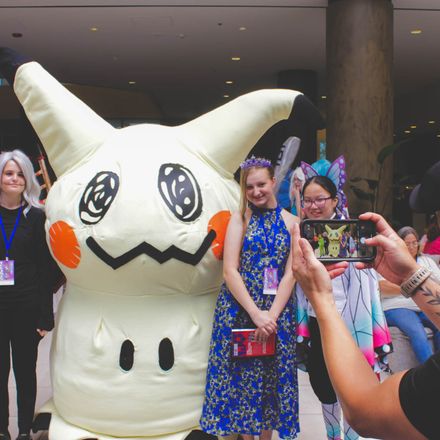Where There's Smoke
Published April 2023
By Karlie Ybarra | 12 min read
It’s a sight familiar to Oklahomans: a bag of fried fast food slowly wilting on the passenger seat. It’s all too easy to pull into a drive-through on the way home from work and grab a cheap, quick meal. It’s an almost irresistible convenience that removes humans as far as possible from the food web. The driver didn’t hunt, gather, or cook the food, doesn’t know who prepared it, and likely isn’t aware of where in the world the ingredients came from—or what those ingredients are. Even when we’re still feeling that afternoon coffee and have the energy to make dinner, the grocery store is filled with underripe fruits (better for shipping), vegetables that are less nutritious than decades ago, and sugar or high fructose corn syrup in products they have no business being in.
Industrialization has increased the amount of food farmers and ranchers can provide, but it’s also removed most of the population from the agricultural process—the indirect cost of which might be higher than we realize. The prevalence of obesity and related diseases are increasing every year. This is especially true among Native Americans. According to the National Library of Medicine, the mortality rate for Native people is 50 percent higher than whites. They also are twice as likely to have diabetes and 1.21 times more likely to die of heart disease.
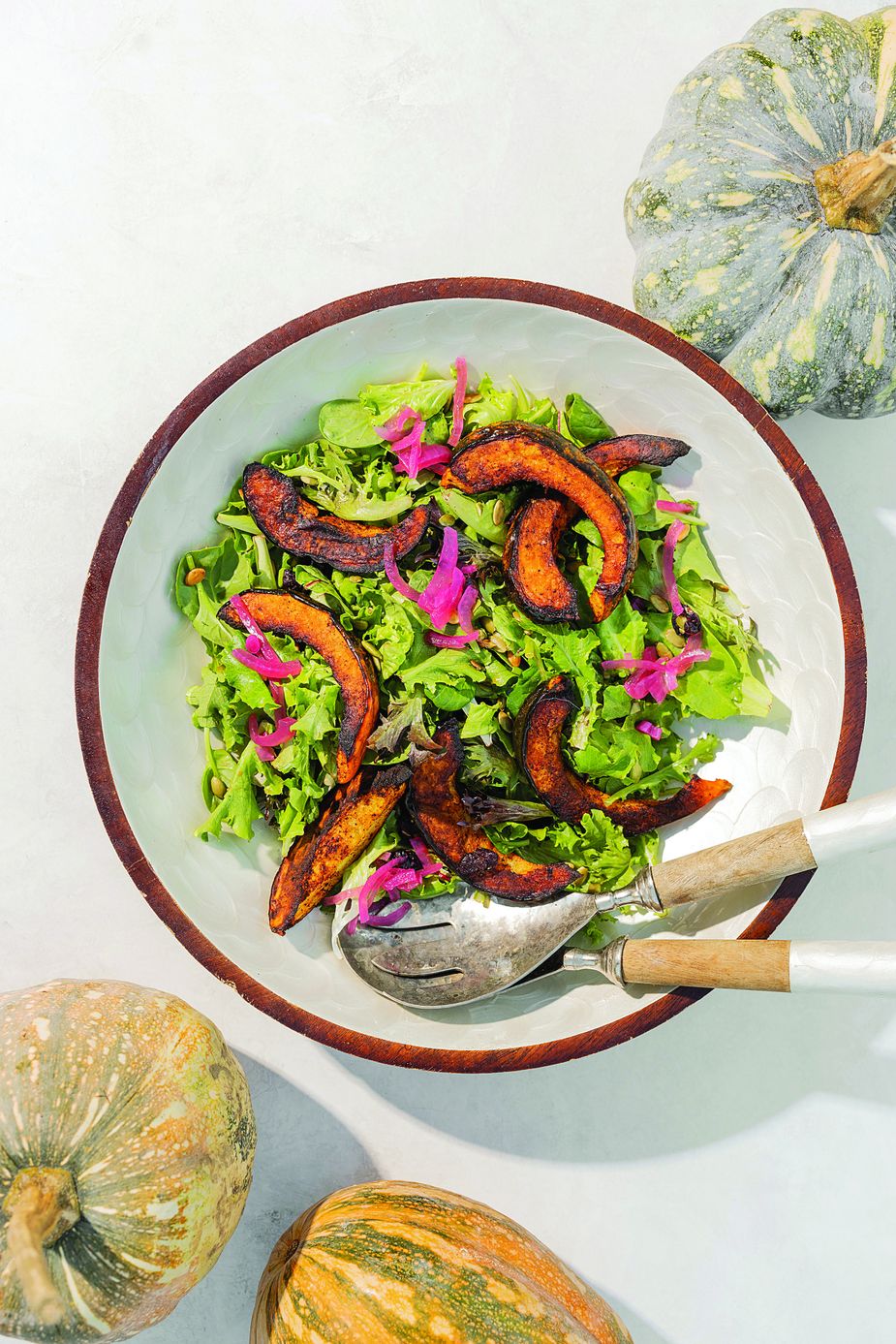
Chef Nico Albert Williams prepared this ancho and maple roasted acorn squash salad with pumpkin seeds, cranberries, pickled onion, and pumpkin vinaigrette. Photo by Valerie Wei-Haas
“Disconnection from our traditional foods is what has made our communities sicker,” says Nico Albert Williams. “It’s caused all of these health disparities in Indigenous communities. Our generational trauma from colonization and all of those things that have happened to us can be healed through reconnecting to the land, to nature, to our traditional foods.”
As a citizen of the Cherokee Nation, Albert Williams’ interest in preparing traditional foods goes way back. She grew up cooking at home, and as she worked her way up through kitchens around Tulsa, she showcased those methods and ingredients. In fact, as the founding executive chef at Duet, she created two entirely new menus for November—Native American Heritage Month—that featured dishes like wild sumac-crusted trout with golden hominy grits and persimmon salsa.
But now, Albert Williams is treading a different path. She’s founded her own catering company so she can share her hospitality with the world exactly as she chooses. Burning Cedar Indigenous Foods has been keeping the chef occupied most days since late 2020, but her mission isn’t just to cook for the masses. With a new 501(c)3 organization—Burning Cedar Sovereign Wellness—Albert Williams and a small team of passionate women intend to improve the health, wellness, and cultural connection of black, Indigenous, and people of color in Tulsa, the outlying Native communities, and beyond.
But how does someone go about helping heal wounds hundreds of years old? For Albert Williams, a stomach full of the delicious foods her people once ate was a good place to start.
“Indigenous food really is just local, quality ingredients prepared simply and thoughtfully,” she says.
Burning Cedar Indigenous Foods is the embodiment of those ideals. Albert Williams doesn’t have a set menu. While fan favorites like bison meatballs and Three Sisters dip are available whenever, many of the company’s catering options are seasonal and dependent on that year’s crop.
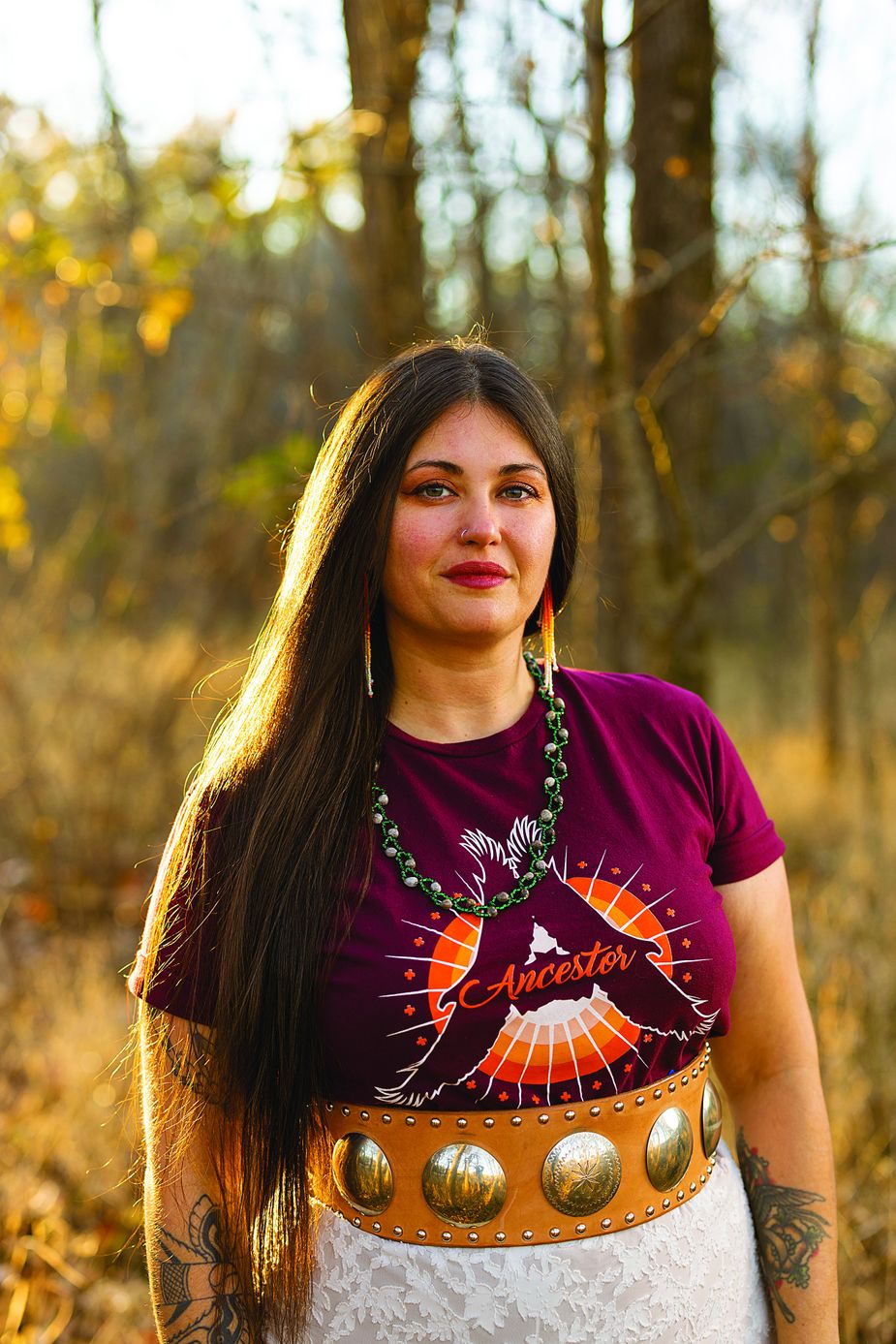
Nico Albert Williams sometimes forages for cooking ingredients in areas around Tulsa. Photo by Valerie Wei-Haas
“I try to source things from Indigenous people and sources,” Albert Williams says. “I use game that’s been hunted; I use ingredients that I’ve foraged.”
Albert Williams forages the persimmons for the sauce drizzled with maple sugar atop cornmeal porridge. For seed-crusted venison chops, the chef retrieves a freshly butchered deer from a resident hunter up Bixby way. She has a strong relationship with the land—the sumac that flavors many of her dishes grows wild in a Tulsa-area urban wilderness—as well as tribal entities and individuals. For example, the bison found in the aforementioned appetizers and bison meatloaf with sage brown gravy often comes from the Osage Nation Butcher House in Hominy. While Burning Cedar’s catering clients can’t get enough of her wojapi cornbread shortcakes, they get so much more than just a delicious meal. That’s where the consultation side of her work comes in.
“With Indigenous foods, there’s so much to learn,” she says. “We combine traditional stories to give context, create an emotional and cultural connection, and a background to the ingredients and explain what makes them special.”
In one of Burning Cedar’s workshops in late 2022, the chef demonstrated the traditional way of making hominy: simmering field corn in a solution made from wood ashes, which is alkaline enough to dissolve the outer husk so it can be rinsed off. The resulting chewy substance is great for making bread dough or adding bulk to soups and stews.
That commitment to education inspired Albert Williams to join Matriarch, an Oklahoma organization created by Indigenous women to empower each other and create stronger communities. That’s how she met the two women who would, some years later, complete the triad of Burning Cedar Sovereign Wellness—Dana Bear and Ashley Crawford Dailey.
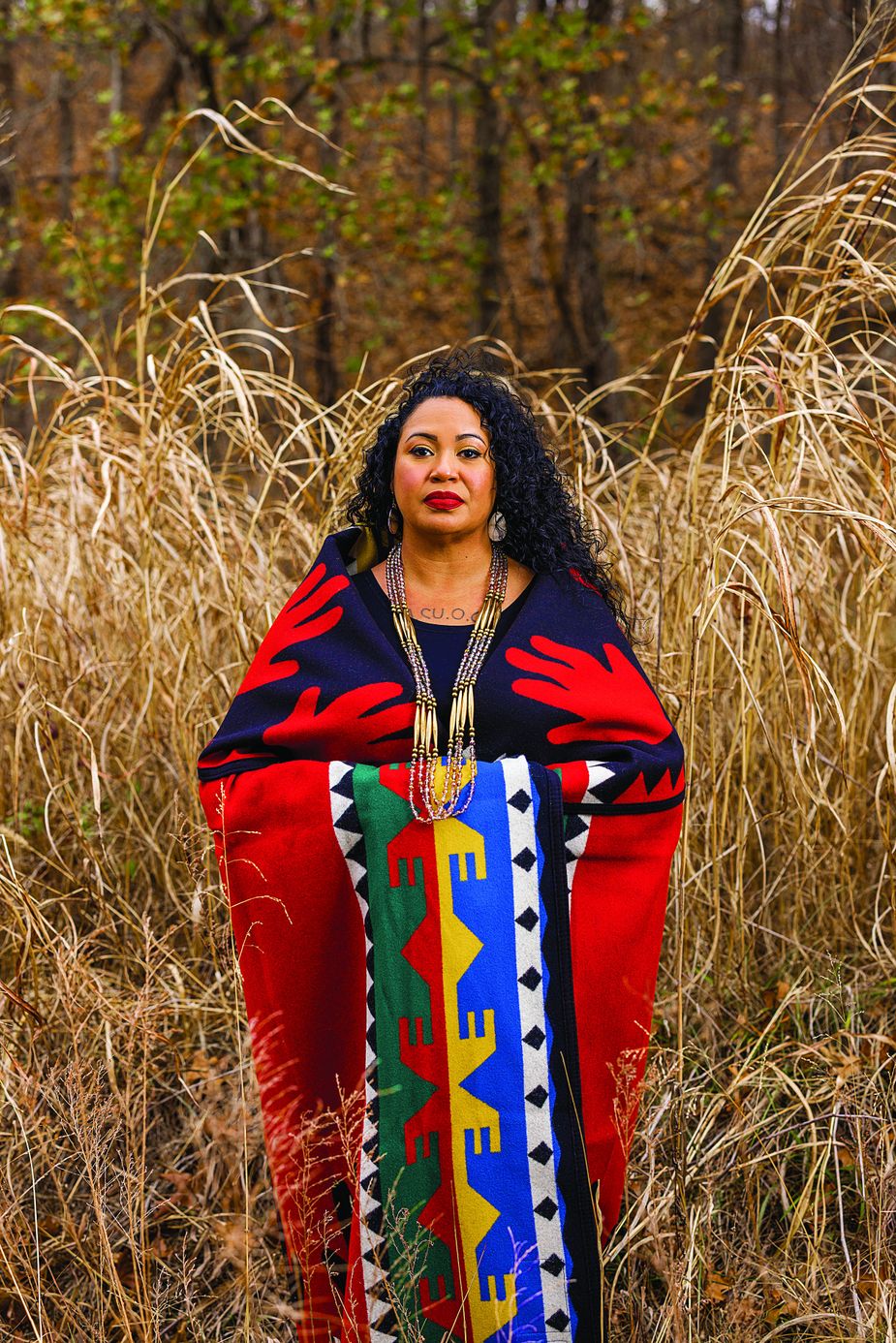
Most mornings, Dana Bear, director of birth work at Burning Cedar Sovereign Wellness, prays at the shore of Hudson Lake, not far from Bartlesville and close to her ancestors’ reservation boundaries. Photo by Valerie Wei-Haas
As a doula and childbirth educator, Bear’s mission might not initially seem to align with Albert Williams’, especially from a Eurocentric perspective.
“The land is our first mother,” says Bear. “Water is our first medicine, and we come from water. When you start making those correlations in life and realizing how important those things are as a whole, it becomes pretty important for our continuance that we can birth our children in a more natural, healthy way.”
Burning Cedar’s director of birth work, Bear was trained in advocacy for birthing families whatever their situation. This has helped many parents avoid medical interventions that could potentially harm the mother and baby, like Caesarean sections caused by failures to progress. Providing children and their caregivers with the best possible start in life will be Bear’s focus once the nonprofit finds a building. Her vision includes a directory of doulas and midwives to create spaces for not just education but also conversation, especially about trauma. The physical requirements of those spaces—Bear would like to provide birthing rooms for families interested in home birth but who don’t feel like their home is a safe place—are matters for Dailey to contend with. Her job is to find a large building preferably in north Tulsa with many rooms (some with privacy), enough parking for the participants in multiple workshops, an area for at least one teaching garden, and more.
But Dailey isn’t just helping Burning Cedar find and fund the perfect location. She’s a board member and official land advisor, a title many years in the making. For the last twelve years, she and her team of real estate agents—all working mothers—have helped people buy their first homes. Their clients have included a large number of people of color, underserved communities, and those in rural areas around north Tulsa. She’s also a big advocate for Land Back, which helps empower tribal citizens to reclaim some of the Native land that was stolen beginning in the nineteenth century.
“Abstracts tell the story of a property from statehood on,” Dailey says. “I became passionate about this movement when I started reading the abstracts and couldn’t believe these people lost their land in such a shady way.”
Educating BIPOC individuals about financial wealth and responsibility, how to build good credit, and how to buy a home—these all are goals for the Burning Cedar team. Owning land allows people to grow their own food, another passion of Dailey and her family, who live and farm on part of the Osage Reservation. It also helps them build healthy finances, which in turn leads to healthier lives.
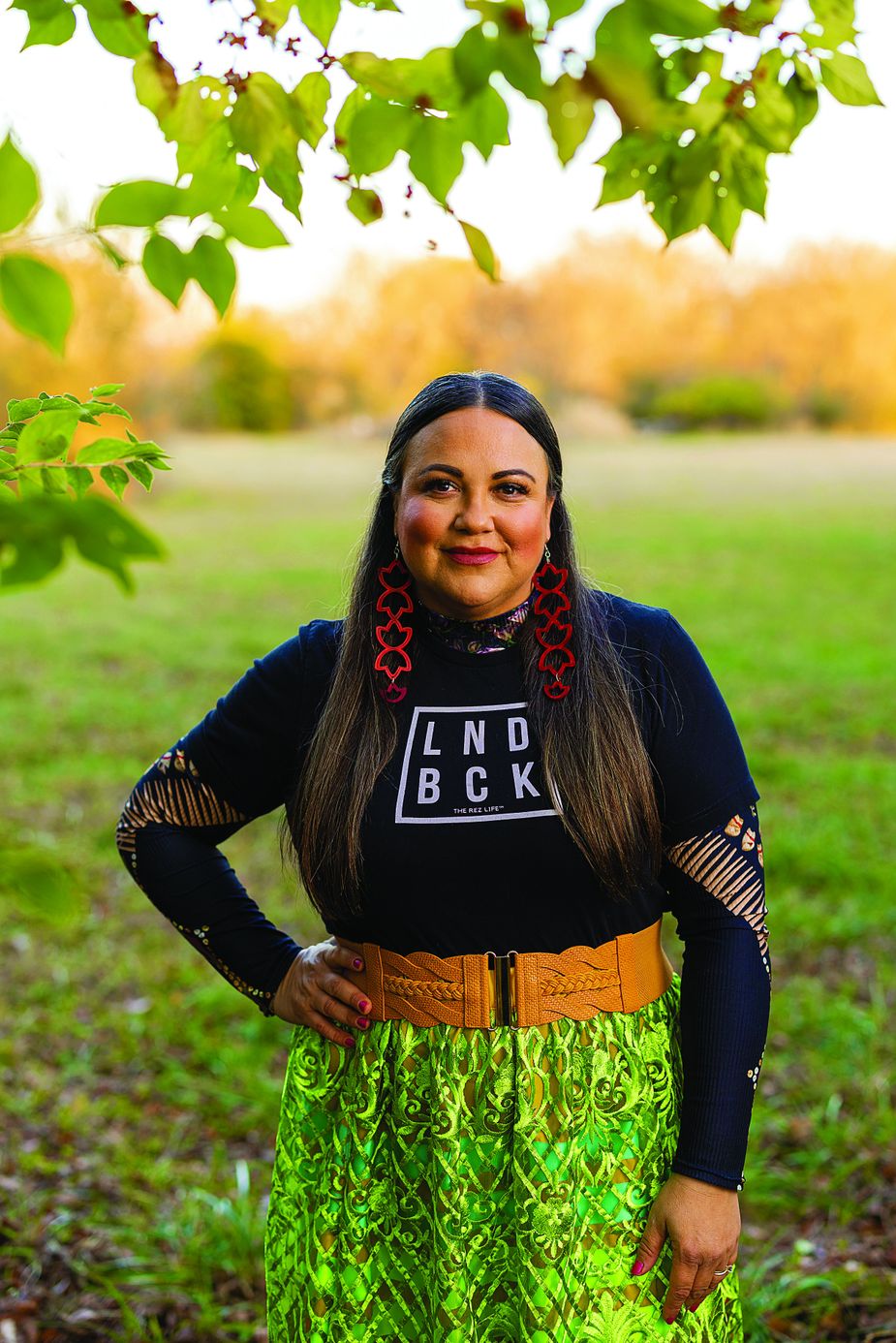
Ashley Crawford Dailey, at her husband’s family’s land on the Osage Nation reservation, acts as Burning Cedar’s land advisor. Photo by Valerie Wei-Haas
Addressing the traumas created by colonization and securing Native sovereignty seem like monumental tasks, but Burning Cedar Sovereign Wellness is glowing with passion for helping people. They plan to acquire a space by late spring and start classes shortly thereafter.
“All it takes is a movement,” Bear says. “All it takes is the whisper, the low roar of that work being done and people being excited about it and wanting to be a part of it. That makes it really easy.”
For Albert Williams, Bear, and Dailey, this is more than a mission: It’s a calling they are happy to answer.
Burning Cedar Indigenous Foods and Burning Cedar Sovereign Wellness

